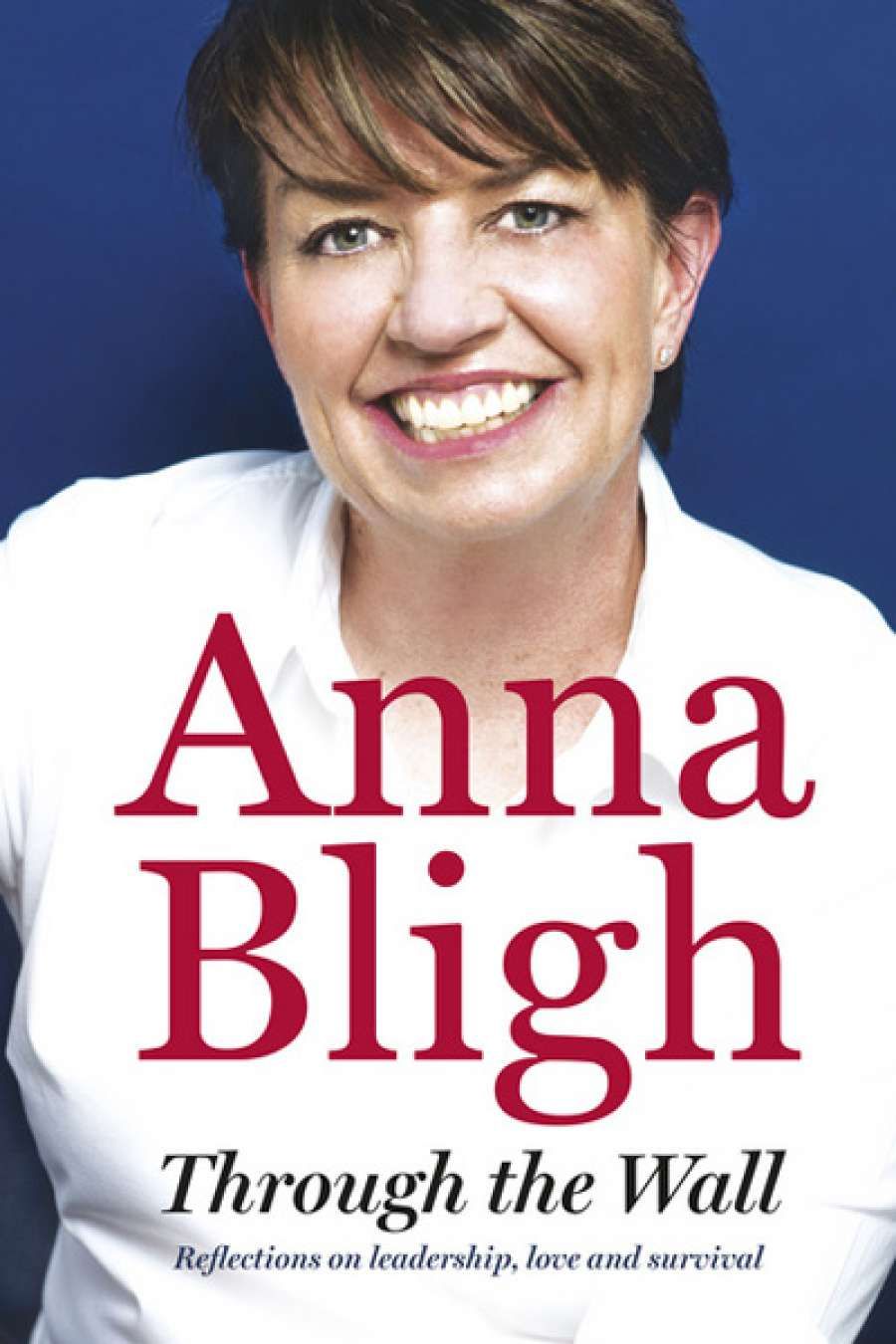
- Free Article: No
- Contents Category: Memoir
- Custom Article Title: Lyndon Megarrity reviews 'Through the Wall' by Anna Bligh
- Review Article: Yes
- Online Only: No
- Book 1 Title: Through the Wall
- Book 1 Subtitle: Reflections on leadership, love and survival
- Book 1 Biblio: HarperCollins, $39.99 hb, 336 pp, 9780732299538
The author demonstrates the challenges and pitfalls of constantly being in the public eye. As we journey in Bligh’s political shoes, we see that once an MP is elected, her life is no longer entirely her own. One small gaffe and the media can magnify it and destroy the ambitions of a politician. Bligh’s career was relatively free of such errors, but the author creates an understanding of how attention to image and anxiety about public perceptions were unavoidable aspects of her political existence. Perhaps more disturbing for MPs like Bligh is that the children of politicians can be turned into ‘news fodder’. At the 2012 elections one journalist tried to do this by asking Bligh’s son ‘what it felt like to be voting for his mother when he knew she would lose’. As Bligh relates, her son turned the tables by saying, ‘Who else gets their first vote on their birthday and gets to vote for their mum at the same time? That feels like winning to me!’
The single event of Bligh’s premiership which is given the most detailed attention is the 2011 Queensland floods. Like many Queensland premiers before her, including Joh Bjelke-Petersen, Bligh became a symbol of Queensland unity, touring affected areas, expressing sympathy to the victims, and reminding people that the government understood their pain and was acting to fix the problem. Bligh gave a noteworthy address at the height of the crisis:
We are Queenslanders … We’re the people that they breed tough north of the border. We’re the ones that they knock down and we get up again ... Together, we can pull through this and that’s what I’m determined to do. And with your help, we can achieve that.
 Anna Bligh
Anna Bligh
Bligh invokes the notion of ‘Queensland difference’ to explain the political and cultural environment of her youth and subsequent political experiences, such as the floods. However, her ‘Queensland is different’ rhetoric, with its assumption of a frontier mentality, is generally unconvincing. The reason why the recent Queensland disasters were so distressing to locals was precisely because they frequently do not possess a frontier mindset. Like other Australians, most Queenslanders are town-dwellers whose parents and grandparents have had no history of doing it tough on the land. They are used to air conditioning, good roads, petrol, electricity, mobile phone coverage, and regular access to fresh bread and milk. The sudden isolation from all these amenities arguably gives the comforting words and presence of politicians such as Bligh more power than in the less ‘connected’ world of even twenty years ago.
‘her ‘‘Queensland is different’’ rhetoric, with its assumption of a frontier mentality, is generally unconvincing’
Bligh’s emphasis on ‘Queensland difference’ is somewhat contradicted by her use of another popular Queensland narrative, which suggests that when Bjelke-Petersen ruled Queensland, there was darkness: then, from 1989, Wayne Goss, Peter Beattie, and Anna Bligh came along and dragged Queensland kicking and screaming into the light. This narrative implies that by conforming to the ‘southern’ states in education and other policy areas, Queensland difference was effectively extinguished by Labor for the public good. The failures of the Bjelke-Petersen era are well documented; Goss and his successors can boast solid achievements in electoral and judicial reform, the arts, the environment, and in many other areas. However, the notion of Queensland as a cultural backwater prior to the ‘refinements’ of the 1990s is a distortion of history. Many ‘conservative’ politicians of the pre-Goss era (Mike Ahern, Jack Pizzey, Gordon Chalk, etc.) made valuable economic, social, and cultural contributions, which were built on by subsequent ALP governments.
Through the Wall does not contain blow-by-blow descriptions of internal Labor politics or an in-depth focus on policy development, but the author has not set out to write such a book. Instead, Bligh has written one of the more readable political memoirs of recent years: we gain a better understanding of the pressures of public office, and get to know the person behind the premier.


Comments powered by CComment